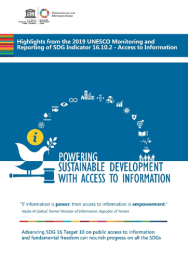Access to Information and Sustainable Development Goals
Access to information (ATI) has been recognised as a key element of sustainable development since the adoption of the Rio Declaration in 1992.[1]
Further in 2015, the 2030 Agenda for Sustainable Development - adopted by all 193 UN member states, the 2030 Agenda for Sustainable Development is a 15-year plan of action “to end poverty, protect the planet and ensure prosperity for all, while strengthening universal peace in larger freedom - acknowledged access to information as a necessary enabling mechanism for transparent, accountable and participatory governance, rule of law and peaceful societies as epitomised by Sustainable Development Goal (SDG) number 16: ‘Peace, Justice and Strong Institutions’. Target 16.10 calls for states to “ensure public access to information and protect fundamental freedoms, in accordance with national legislation and international agreements”.
The Human Rights Council in its 2020 resolution on freedom of opinion and expression (General Assembly A/HRC/RES/44/12) at its 44th regular session recognises that “public authorities should strive to make information available, whether the information is proactively published electronically or provided upon request...” .
The Windhoek +30 Declaration was adopted on 3 May 2021, during the global celebration event of the World Press Freedom Day, affirming the need to uphold information as a public good that serves as a shared resource for the whole of humanity. Emphasizing the importance of press freedom, independence and pluralism to guarantee access to information, the Declaration also sets out recommendations to secure information as a public good by addressing media viability, promoting Internet company transparency and enhancing citizens’ media and information literacy competencies.
Within the perspective of the 2030 Agenda, access to information is critical for empowering the public to make decisions, holding governments accountable, evaluating public officials in implementing and monitoring the SDGs, and facilitating effective public participation.
This has been well attested to during the COVID-19 pandemic, marked by a growing public demand for information that is accurate, timely and reliable. The need for openness, transparency, and accountability has never been stronger. Where civic space was shrinking and disinformation and misinformation expanding, access to information has helped counterbalance the situation, playing its role as a tool for transparency, through which the public could exercise their right to information. This has facilitated public participation and promoted civic engagement in response to the crisis.
UNESCO and the monitoring and reporting on SDG Indicator 16.10.2
Following the approval of the SDG framework in 2017 by the UN General Assembly, UNESCO was designated as the custodian agency for Indicator 16.10.2. Under this mandate, UNESCO monitors and reports to the UN Secretary-General each year on “the number of countries that adopt and implement constitutional, statutory and/or policy guarantees for public access to information”, giving attention to both components: “adoption” and “implementation”.
UNESCO and its Institute for Statistics (UIS) developed a methodology to help measure and report on Indicator 16.10.2. UNESCO believes that when countries engage themselves in a self-assessment through the survey, they can identify their own gaps in terms of implementation of ATI laws, and better strategize for future improvements.
countries took part in UNESCO's pilot survey in 2019.
Findings were presented at a side-event during the UN’s High-Level Political Forum in July 2019. The survey instrument was later refined for a full deployment in 2020 and was subsequently further improved for the 2021 cycle.


Since the pilot phase in 2019, UNESCO survey has brought impact beyond measuring countries’ progress on achieving SDG Target 16.10. Many local actors, including ATI oversight bodies and civil society actors, have been mobilised to network with each other in collecting data for the survey. Some countries have also used the information assembled to identify areas of improvement. As such, the survey is not only contributing to assessing SDG Indicator 16.10.2, but also to securing ATI implementation.
With the support of various donors to the IPDC, UNESCO has been able to facilitate capacity development initiatives and awareness-raising efforts in several countries, such as Côte d’Ivoire, Ethiopia, Ghana, Indonesia, Mongolia, Morocco, Myanmar, Rwanda, Senegal, Sierra Leone, Sri Lanka, Thailand and Tunisia, as well as in the Latin American region. This line of action has been done through collaboration with information commissioners and their networks, such as the International Conference of Information Commissioners and Red de Transparencia y Acceso a la Informacion.


